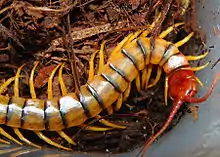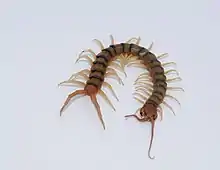Scolopendra polymorpha
Scolopendra polymorpha, the common desert centipede, tiger centipede, banded desert centipede,[1][2] or Sonoran Desert centipede, is indigenous to the Southwestern United States and northern Mexico, north to the Pacific coast.[3][4] It inhabits dry grasslands, forest, and desert; in these habitats, the centipedes generally take up residence under rocks, though they have been observed creating burrows in suitable environments and inside rotting logs.
| Scolopendra polymorpha | |
|---|---|
 | |
| Scientific classification | |
| Kingdom: | Animalia |
| Phylum: | Arthropoda |
| Class: | Chilopoda |
| Order: | Scolopendromorpha |
| Family: | Scolopendridae |
| Genus: | Scolopendra |
| Species: | S. polymorpha |
| Binomial name | |
| Scolopendra polymorpha Wood, 1861 | |
Their bodies generally reach 4–7 in (10–18 cm) in length. Coloration is variable, hence the species name polymorpha which means "many forms", and alternative common names like "multicolored centipede". The body segments have one dark lateral stripe, so they are also known as the tiger centipede or tiger-striped centipede. Generally, this species has a darker brown-, red-, or orange-colored head and lighter brown, tan, or orange body segments with yellow legs. Its antennae have seven or more smooth segments.


References
- "CalPhotos: Scolopendra polymorpha; Banded Desert Centipede". Calphotos.berkeley.edu. Retrieved 2011-09-14.
- "Tiger Centipede, Scolopendra polymorpha". Nathistoc.bio.uci.edu. 2006-12-08. Retrieved 2011-09-14.
- "Scolopendra Polymorpha". Cacoseraph.exofire.net. Archived from the original on 2012-04-02. Retrieved 2011-09-14.
- "Tiger Centipede – Scolopendra polymorpha". BugGuide.Net. Retrieved 2011-09-14.
External links
 Media related to Scolopendra polymorpha at Wikimedia Commons
Media related to Scolopendra polymorpha at Wikimedia Commons Data related to Scolopendra polymorpha at Wikispecies
Data related to Scolopendra polymorpha at Wikispecies